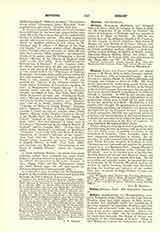www.catholic.com/encyclopedia/melchior-hittorp


Click to enlarge
Hittorp, MELCHIOR, theologian and liturgical writer, b. about 1525, at Cologne; d. there in 1584. On the completion of his studies he obtained the degree of Licentiate of Theology, and was appointed canon at S. Maria ad Gradus. In 1593 he was elected dean of the collegiate church of St. Cunibert. At the request of Jacob Pamelius, then canon of Bruges and later Bishop of St-Omer, Hittorp published in 1568 “Vetustorum ecclesiae patrum libri varii de divinis catholicae ecclesiae officiis”, a work containing various writings of Isidore of Seville, Alcuin, Rhabanus Maurus, Strabo, Berno, and others. An enlarged edition by Ferrari (1591) was reproduced in the “Magn. Bibl. vet. PP.”, X (Paris, 1644).
FRANCIS MERSHMAN
Enjoying this content? Please support our mission!Donatewww.catholic.com/support-us

